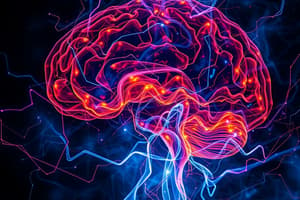Podcast
Questions and Answers
What is the background of the psychodynamic perspective?
What is the background of the psychodynamic perspective?
The psychodynamic perspective originated with the work of Sigmund Freud and focuses on the role of the unconscious mind and our past experiences as the cause of our current behaviors.
What is the conscious mind?
What is the conscious mind?
The conscious mind is what we are currently thinking about (immediate awareness).
What is the preconscious mind?
What is the preconscious mind?
The preconscious mind can be accessed with relative ease by retrieving stored memories (accessible memories).
What is the unconscious mind?
What is the unconscious mind?
How was the content of our unconscious mind revealed according to Freud?
How was the content of our unconscious mind revealed according to Freud?
What two instinctual drives did Freud claim motivated behavior from the unconscious?
What two instinctual drives did Freud claim motivated behavior from the unconscious?
What are the three parts of personality that Freud identified?
What are the three parts of personality that Freud identified?
What conflict can arise between the id and superego?
What conflict can arise between the id and superego?
What does it lead to if the ego can't resolve the conflict?
What does it lead to if the ego can't resolve the conflict?
What are the strengths of the psychodynamic perspective?
What are the strengths of the psychodynamic perspective?
What are the weaknesses of the psychodynamic perspective?
What are the weaknesses of the psychodynamic perspective?
Flashcards are hidden until you start studying
Study Notes
Background of the Psychodynamic Perspective
- Originated with Sigmund Freud, emphasizing the unconscious mind's role.
- Believes past experiences shape current behaviors.
- Mind consists of three levels: conscious, preconscious, and unconscious, often illustrated with an iceberg analogy.
Conscious Mind
- Represents immediate awareness and current thoughts.
Preconscious Mind
- Contains accessible memories that can be retrieved easily.
Unconscious Mind
- Houses hidden elements, including drives and repressed painful emotions, often inaccessible.
Revelation of the Unconscious Mind
- Accessed through dreams, slips of the tongue, free association, and projective tests.
Free Will and Motivational Drives
- Freud claimed no free will exists due to unconscious control over behavior.
- Behavior is motivated by two instinctual drives:
- Eros: Life instinct.
- Thanatos: Death instinct.
Structure of Personality
- Personality consists of three components residing in the unconscious:
- Id: Represents basic instincts and desires.
- Ego: Mediates between id and reality.
- Superego: Represents moral consciousness.
Conflict Creation
- Tension arises when the id desires are opposed by the superego, leading to internal conflict for the ego.
Ego Anxiety
- If the ego fails to resolve conflicts between id and superego, it results in "ego anxiety," a potential cause of mental health issues.
Strengths of the Psychodynamic Perspective
- Explains mental disorder development by emphasizing the unconscious mind's influence on feelings and behavior.
- Proposes therapeutic approaches for individuals with mental disorders.
- Popularized case study methodology in psychology, providing in-depth insights into individual experiences.
Weaknesses of the Psychodynamic Perspective
- Considered unscientific due to non-verifiable theories, limiting empirical testing.
- Relies heavily on Freud's case studies, which are subjective and prone to researcher bias, raising questions about validity and generalization to broader populations.
Studying That Suits You
Use AI to generate personalized quizzes and flashcards to suit your learning preferences.




